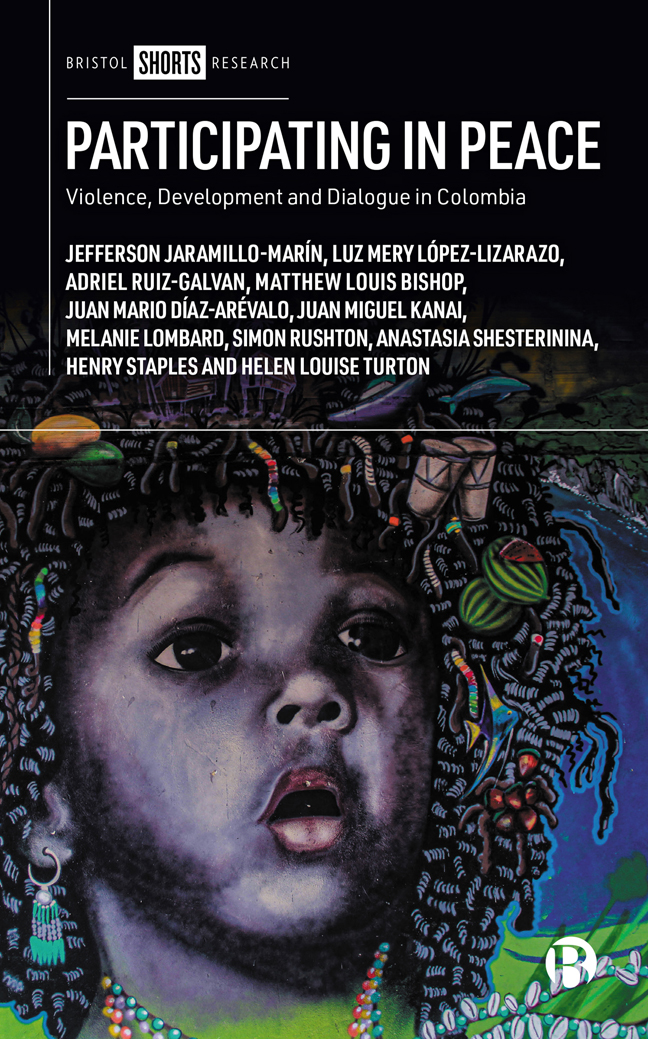Book contents
- Frontmatter
- Contents
- List of Maps and Tables
- List of Abbreviations
- Notes on the Authors
- Acknowledgements
- Note on the Cover Image
- Introduction
- One Peace through Participation: The Colombian Experience
- Two Participation through Dialogue: Co-Producing Peace and Research
- Three Protecting Catatumbo: Dialogue as Conflict-Sensitive Environmentalism
- Four Transforming Buenaventura: Dialogue for Municipal Peacebuilding
- Conclusion
- References
- Index
Conclusion
Published online by Cambridge University Press: 24 January 2024
- Frontmatter
- Contents
- List of Maps and Tables
- List of Abbreviations
- Notes on the Authors
- Acknowledgements
- Note on the Cover Image
- Introduction
- One Peace through Participation: The Colombian Experience
- Two Participation through Dialogue: Co-Producing Peace and Research
- Three Protecting Catatumbo: Dialogue as Conflict-Sensitive Environmentalism
- Four Transforming Buenaventura: Dialogue for Municipal Peacebuilding
- Conclusion
- References
- Index
Summary
This book has been inspired by two central questions. First, how are communities in Colombia seizing the initiative to build peace in the wake of the historic 2016 peace agreement? And second, what can participatory research contribute to these efforts, both within and beyond Colombia?
As is the case with any project in such a complex and shifting social and political situation, the findings we present and discuss here are necessarily provisional and partial. Colombia's conflict, the changing local and national politics surrounding it and associated efforts to understand and reduce violence – efforts that include local actors, NGOs, governments, international agencies and the research community alike – continue to evolve with dizzying speed. A meaningful or comprehensive peace in Colombia is a long way from being successfully ‘built’. Yet notwithstanding the limitations of our own efforts, we are confident of the significant untapped potential for engaged, immersive and non-extractive research in ‘post-conflict’ scenarios and, however embryonic and limited they may be, it is plainly evident that many communities beyond those we have examined here are constantly engaged in the careful, gradual and difficult business of constructing their own visions of more peaceful lives and futures.
In this concluding chapter, we present a synthesis of the book's central empirical, theoretical and methodological insights. We begin by placing the key findings from the two empirical cases in dialogue with one another and in relation to the wider story of the Colombian peace process, including the ‘territorial peace’ agenda. Here we return to the book's core concept of DST and ask what potential lessons these experiences can offer for other community-based actors. In the second section, we outline our key reflections for peace scholars and practitioners, making the case that DST is not only a descriptive concept describing a particular form of dialogue practice, but also a normative one which provides an entry point for PAR-based research to play a meaningful role in partnering with and supporting communities within and beyond Colombia to overcome the conflict(s) that inhibit their ability to live with dignity. Finally, we offer a brief analysis of recent events in Colombia, specifically the election of President Petro in 2022, and the implications of his early efforts towards a lasting form of ‘total peace’.
- Type
- Chapter
- Information
- Participating in PeaceViolence, Development and Dialogue in Colombia, pp. 117 - 130Publisher: Bristol University PressPrint publication year: 2023



